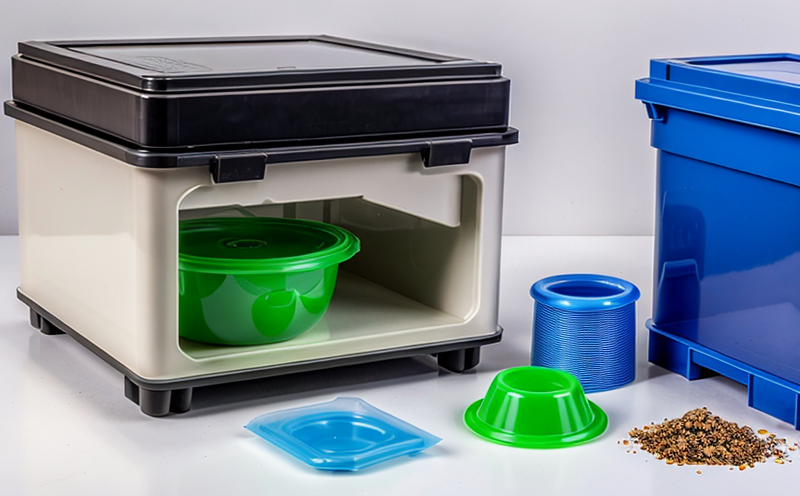ASTM F2825 Plastics Packaging Performance Testing under Cold Chain
The ASTM F2825 standard provides a comprehensive framework for evaluating the performance of plastics packaging materials and components in cold chain environments. This service is critical for manufacturers, quality managers, compliance officers, and R&D engineers who need to ensure their products meet stringent temperature stability requirements.
Plastics used in food packaging, pharmaceuticals, and other temperature-sensitive goods must withstand harsh conditions during transportation and storage. ASTM F2825 addresses these challenges by simulating real-world cold chain scenarios, such as refrigeration, freezing, and thawing cycles.
The test protocol outlined in this standard involves subjecting samples to controlled temperature fluctuations that mimic the environmental conditions encountered during cold chain logistics. This process helps manufacturers identify potential weaknesses or failures before products reach the market.
Key aspects of ASTM F2825 include:
- Temperature cycling from -40°C to +30°C
- Relative humidity control at 93% RH for a specified duration
- Duration tests lasting up to 168 hours (7 days)
These rigorous testing conditions are designed to expose any material defects or design flaws that could compromise the integrity of the packaging. By adhering to ASTM F2825, manufacturers can ensure their products meet global standards for safety and efficacy.
Here’s a closer look at how this service works:
- Sample preparation: Samples are cut from representative areas of the packaging material.
- Temperature cycling: Samples undergo repeated cycles between -40°C and +30°C over 168 hours.
- Humidity testing: Samples are exposed to high humidity conditions for a specified duration.
- Data analysis: Comprehensive data is collected on sample integrity, moisture absorption, dimensional stability, and mechanical properties.
The results of ASTM F2825 tests provide critical insights into the performance characteristics of packaging materials under cold chain conditions. This information allows manufacturers to optimize their product designs for better durability, safety, and compliance with regulatory requirements.
| Applied Standards | Description |
|---|---|
| ASTM F2825-17 | Standard Test Method for Determining the Performance of Plastics Packaging under Cold Chain Conditions |
The application of ASTM F2825 is widespread across various industries, including food and beverage, pharmaceuticals, and medical devices. By ensuring packaging integrity during cold chain transport, manufacturers can protect their products from degradation due to temperature fluctuations.
For instance, in the food industry, improper packaging could lead to spoilage or contamination, resulting in significant financial losses and reputational damage. In the pharmaceutical sector, compromised packaging may jeopardize drug efficacy and patient safety. Thus, compliance with ASTM F2825 is essential for maintaining high standards of quality and reliability.
Applied Standards
| Applied Standards | Description |
|---|---|
| ASTM F2825-17 | Standard Test Method for Determining the Performance of Plastics Packaging under Cold Chain Conditions |
The ASTM F2825 standard is widely recognized and adopted by regulatory bodies, manufacturers, and suppliers worldwide. It ensures that packaging materials are tested under conditions that closely mimic real-world cold chain logistics.
By adhering to this standard, companies can demonstrate their commitment to quality and compliance with international best practices. This not only enhances brand reputation but also helps in building trust among consumers and regulatory authorities.
International Acceptance and Recognition
- The ASTM F2825 standard is recognized by major global organizations such as the International Organization for Standardization (ISO) and the European Committee for Standardization (CEN).
- Many countries have incorporated ASTM F2825 into their national standards, making it a de facto international practice.
The widespread acceptance of this standard underscores its importance in ensuring product integrity across diverse geographies. Compliance with ASTM F2825 is thus not only beneficial for domestic markets but also facilitates seamless exports to countries that have adopted the standard as part of their regulatory framework.
Companies operating in multiple jurisdictions can streamline their quality assurance processes by adopting ASTM F2825, thereby reducing compliance costs and improving operational efficiency.
Use Cases and Application Examples
- Food Packaging: Ensuring that packaging materials protect perishable food items during cold chain transport.
- Pharmaceuticals: Verifying the integrity of drug containers to prevent contamination or degradation under extreme temperature conditions.
- Biotech Products: Guaranteeing stability and efficacy of biologics during refrigerated shipping.
ASTM F2825 testing is particularly valuable for products that are sensitive to temperature changes. By subjecting packaging materials to the specified cold chain conditions, manufacturers can identify any potential weaknesses or issues early in the development process.
For example, a pharmaceutical company developing a new vaccine may use ASTM F2825 tests to ensure that their vials maintain the required temperature profile during shipping from manufacturing facilities to distribution centers and ultimately to healthcare providers. Failure to meet these standards could result in wasted resources or compromised product quality.





